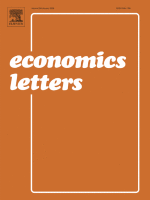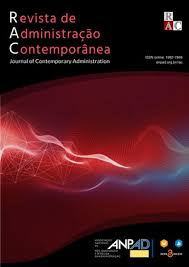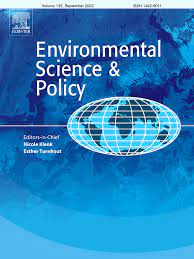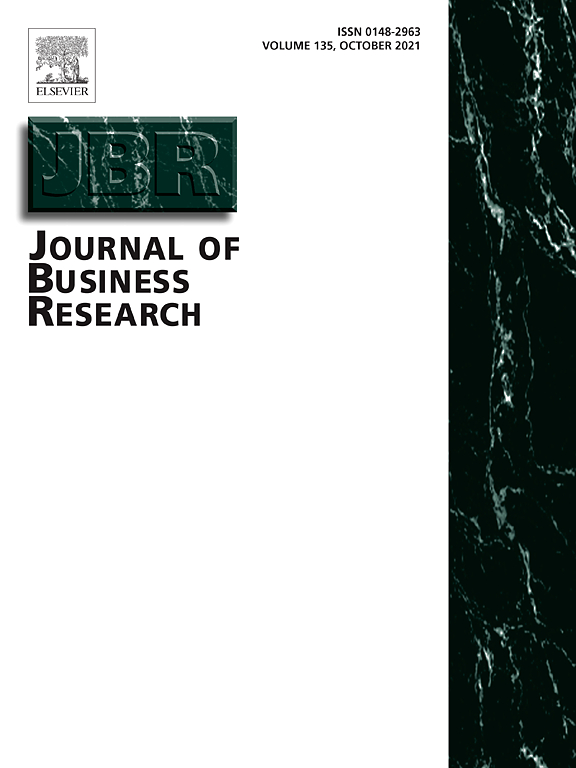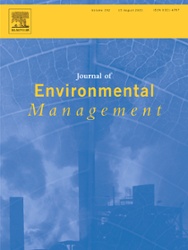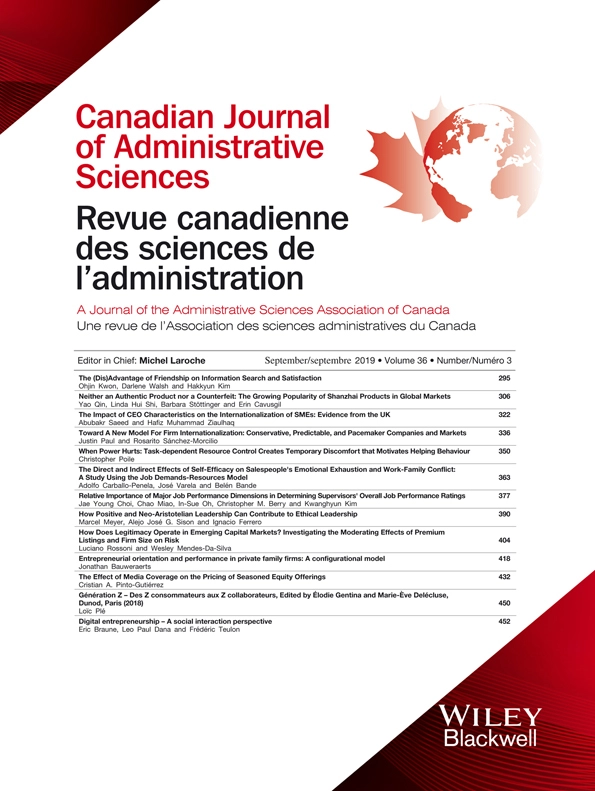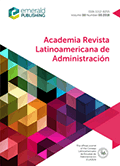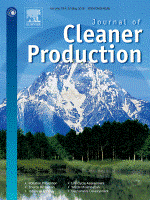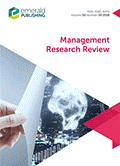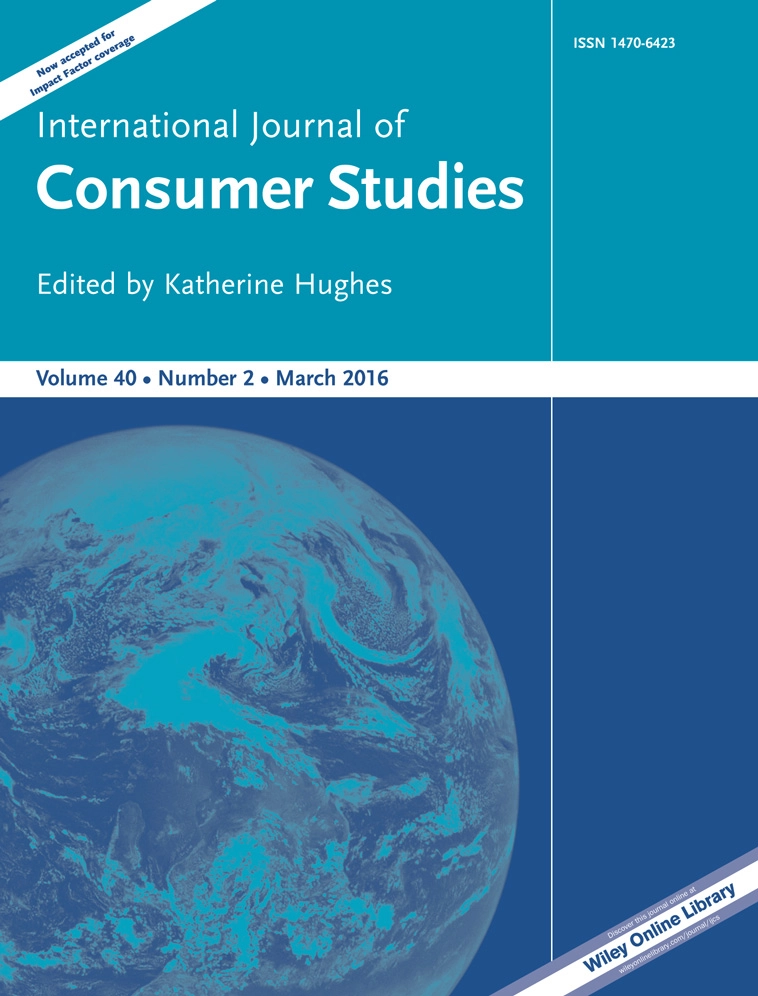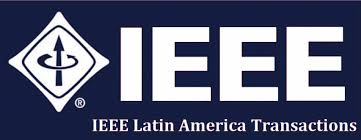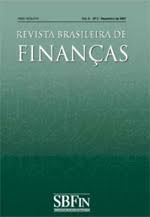Referred Articles
Os esforços de pesquisa, associados ao aprendizado decorrente do contato continuado com gestores de companhias, têm permitido a produção e publicação de livros e capítulos de livros em parceria com pesquisadores atuantes nos campos de interesse.
Informed Decisions Regarding Flood Events Induces Propensity For Insurances. Environmental SCience & Policy, 136, 2022.
Abstract
From the start of adulthood, consumers are frequently faced with complex financial decisions, and the consequences of these decisions may be reflected throughout the rest of their lives. As access to credit has expanded among college students around the world, it is critical that we understand both universal and culture-specific processes. Although some work has examined credit card use in two cultures simultaneously, there is, to our knowledge, no research examining such use in three cultures on three continents and across both genders. This study analyzes credit card use behavior among 1458 young adults living either in Brazil, the United States, or France. A structural equations model is used to incorporate relationships between the latent variables. The model, which was validated by the study, examines how financial well-being is affected by the way in which the individual uses credit cards, which in its turn is affected by social comparison and by financial self-confidence, the latter being also impacted by the financial education received from the parents. In the comparison between groups we found evidence that men are more dependent on parental education than women.
Abstract
Conteúdo
The literature documents that individual behavior and climatic change have recently been given more and more space in the definition of company strategies. However, in terms of preparing for catastrophes, few inquiries have been made into the individual propensity to acquire insurance, especially in terms of People with Disabilities (PwD). In this study, we assess the effect of information on the propensity of heads of households to acquire home insurance against forms of natural disasters, particularly flooding. We conduct a survey of over 500 individuals, including blind individuals, to verify the intuition that there is a causal link between the existence of information and the willingness of individuals to acquire flood insurance. The results reveal that visually deficient individuals are approximately 300% more likely to buy this insurance than other individuals. However, when PwD have information regarding the potential risk and harm caused by floods, this marginal effect is attenuated.
Abstract
Abstract
This study investigates the effect of interlocking directorates on national and international mergers and acquisitions (M&A) in Brazil. Based on a sample of 153 large Brazilian firms in a time series (2000–2015), and using network techniques and regression analysis, this study addresses the hypothesis: board interlocking reduces the asymmetry of information in M&A, leading companies with a greater number of ties (degree centrality) to be more likely to participate in M&A. The results show that firms that have a larger number of ties with other firms through board interlocks (higher degree centrality) are more likely to perform M&A. Other network measures (closeness, eigenvector, betweenness, and structural holes) have no significant impact on the likelihood to participate in M&A. This study examines the impact of board interlocking on firms’ propensity to undertake M&A while controlling for financial, corporate governance, and country-level governance variables in the explanatory model. This paper also contributes by identifying the determinants of M&A performed by companies headquartered in emerging countries such as Brazil, a major participant in M&A processes at the international level.
Abstract
ABSTRACT
Purpose – The subject of making choices under risk has been studied based on the assumption that decision makers are fully informed. However, in real life situations individuals frequently need to make choices without the benefit of essential information. This study analyzes decision making in the absence of information about the probabilities of losses and potential impacts, which constitutes a context of ignorance, or alternatively making choices under risk or uncertainty. Theoretical framework – This study is supported by theoretical aspects related to decision making under ignorance, specifically within the context of buying insurance. Design/methodology/approach – We used One Way ANOVA and regressions based on the data collected from two experiments regarding the willingness to acquire extended electronic equipment warranties, which involved the participation of over 130 volunteers. Findings – Our findings suggest that the absence of economic information – deficient disclosure – makes the cost of insurance something relevant to the consumer and is negatively associated with the propensity to acquire insurance. In addition, the cost of repairs and the probability of equipment breaking increases the propensity to acquire an extended warranty. Research, Practical & Social implications – By making information relevant to consumption decisions accessible in a transparent manner, agents can induce a surge in consumption, making the market more efficient and society more resilient in the face of risks. Originality/value – This study may be the first to provide empirical evidence regarding the purchase of insurance within a context of ignorance in emerging markets.
Abstract
This study investigates the interplay between integrated reporting (IR) and capital markets. In particular, building on voluntary disclosure and information processing theories, we hypothesize and empirically find that IR adoption improves analysts’ ability to make accurate earnings forecasts. Whereas previous studies focus on the South African context, we rely on an international sample that also allows us to study the moderating effect of the corporate governance regime (shareholder or stakeholder oriented). The results suggest that IR improves analysts’ ability to make accurate predictions to a larger extent in North America than in Europe, and we derive interesting insights on the much‐debated nature of IR. This study offers valuable insights to policy makers interested in improving disclosure practices in the financial market.
Abstract
Abstract
This paper proposes a current research agenda on crowdfunding from two different perspectives, mass media and geography. It is believed that these two elements must exert some kind of influence on the dynamics of the investments made in that market. Semantic analysis of mass news can be a useful tool for investors to assess their exposure to risk as well as help predict financial returns. Geography, on the other hand, can be used on the origin of the capital contributions and, therefore, present information on the location and regional characteristics of the investors.
Abstract
abstract
Drawing on an institutional theoretical perspective, we investigate the impact of the origins of organizational legitimacy on systematic risk using a sample of 358 Brazilian companies between the years 2002 and 2007. We regard three origins of legitimacy—formal–regulatory (presence in premium listings), cultural–cognitive (board of directors), and normative legitimacy (reputation)—to empirically investigate how a company’s size and adherence to premium lists moderate other sources of legitimacy. Our results indicate that only under apparently better quality corporate governance conditions—presence in premium listings—do corporate reputation and the board of directors reduce systematic risk. In addition, we show that the effect of reputation on risk is positively moderated by firm size.
Abstract
abstract
Purpose: Managing the risks associated to world food production is an important challenge for governments. A range of factors, among them extreme weather events, has threatened food production in recent years. The purpose of this paper is to analyse the impact of extreme rainfall events on the food industry in Brazil, a prominent player in this industry. Design/methodology/approach: The authors use the AR-GARCH-GPD hybrid methodology to identify whether extreme rainfall affects the stock price of food companies. To do so, the authors collected the daily closing price of the 16 food industry companies listed on the Brazilian stock exchange (B3), in January 2015. Findings: The results indicate that these events have a significant impact on stock returns: on more than half of the days immediately following the heavy rain that fell between 28 February 2005 and 30 December 2014, returns were significantly low, leading to average daily losses of 1.97 per cent. These results point to the relevance of the need for instruments to hedge against weather risk, particularly in the food industry. Originality: Given that extreme weather events have been occurring more and more frequently, financial literature has documented attempts at assessing the economic impacts of weather changes. There is little research, however, into assessing the impacts of these events at corporate level.
Abstract
Abstract
Purpose: The purpose of this paper is to analyze how the type of ownership and control moderates the effect of the board social capital on the implied cost of capital. To do so, the authors analyzed the effect of the board social capital by the relational resources present in its direct and heterogenous ties, considering the predictions of analysts about the implied cost of capital. Design/methodology/approach: The data panel comprised 137 companies listed on the Brazilian stock exchange between the years of 2002 and 2015, generating a total of 535 observations. The authors check the robustness of the results through instrumental variables and systems of equations, as well as compete for the effect of board social capital both by the board and ownership structures. Findings: Results show that the board relational resources, both in direct and heterogeneous ties, significantly reduce the implied cost of capital for private companies, but not for state-owned companies. Board social capital reduces the cost of capital even when the results compete with the board structure and concentration of ownership, being able to mitigate the discount in the cost of capital by the presence of dominant shareholders. Originality: This study uses a more theoretically and empirically comprehensive measure of board social capital than the majority of studies that use only network position indicators. So, contrasting the effect of this measure on the implied cost of capital between private and state-owned companies, the authors also demonstrate that the board social capital can mitigate the discount by ownership concentration on the implied cost of capital.
Abstract
Abstract
Starting from sociological perspectives on complexity, we show how the social capital of boards and owners networks affects the implied cost of capital of companies listed on Brazilian stock exchange. We specifically show arguments and evidence that the effect of the relational resources found in the direct, indirect, and heterogeneous board’s ties reduces the cost of capital while relational resources embedded in shareholder networks increase the cost of capital. Our results show that while the increase in the relational resources of the board reduces the implied cost of capital, an increase in these shared resources in the ownership relationships of the firm increases the cost of financial capital.
Abstract
Abstract
This article investigates how real estate stakeholders price information conveyed by voluntary environmental certification schemes in Sao Paulo, the largest metropolitan area of Latin America. In addition to low incidence of green buildings, the city and many local urban agglomerations in Brazil exhibit weak environmental performance due to limited capacity to enforce existing regulation. Therefore, we exploit the role of internationally accredited third-party environmental audit schemes. In addition to comparing labelled and non-labelled properties in a hedonic framework, we also examine pricing discrepancies related with the intention to certify (registration), but no achievement of actual certification in a timely manner. Our results systematically indicate that labelled office properties in Sao Paulo yield a larger green premium than their peers from developed countries. Findings also suggest that applicants who do not obtain the label upon delivery do not receive any green premiums and may be subject to discounts, depending on specification, beyond that of other non-green office buildings. These findings provide further evidence of the relevance of market diffusion and economic governance linked to the implicit pricing of environmental labels.
Abstract
Abstract
The finance literature has documented efforts to assess the economic impacts of climate on the global economy. However, the literature regarding empirical evidence from the energy sector is limited, particularly at the firm level. Therefore, this study assesses the impact of climate variables, i.e., temperature, rainfall, and localization, on the value of energy distribution companies. We used a unique dataset from a representative emerging market where hydropower plants are the most relevant source of energy. Based on static and spatial panel data analysis, the findings suggest that temperature and rainfall have a significant effect on the value of these companies. These results highlight the need for investments to ensure the resilience of the infrastructure of the energy sector and the operational efficiency of these companies against possible risks posed by climate variables.
Abstract
Abstract
Finance literature documents associations between a family’s financial literacy and its propensity to borrow. However, most studies focus exclusively on formal loan markets. Based on 2,023 observations about financial behavior of Brazilian families, we examined the impacts of financial literacy on informal borrowing, such as loans from friends or moneylenders. Using multinomial logit models, we compared financial literacy’s effects on the propensity to take informal loans between families that did not borrow at all and those who took bank loans. Financial literacy is measured by the investment in capitalization bonds, a financial instrument in the Brazilian market. The results suggest that financial literacy’s relevance to informal loans may exceed that for formal credit channels.
Abstract
Abstract
Given the rising interest in corporate social responsibility (CSR) globally, this paper investigates whether the financial profile of a firm is associated with superior environmental, social and governance (ESG) performance, considering firms from Brazil, Russia, India, China and South Africa (the so-called BRICS countries) with the aim of addressing a gap in relevant research. The study entails an analysis of ESG performance in sensitive industries (i.e., those subject to systematic social taboos, moral debates, and political pressures and those that are more likely to cause social and environmental damage). To test our hypotheses, we applied linear regressions with a data panel using the Thomson Reuters Eikon™ database to analyze data from 365 listed companies selected from BRICS between 2010 and 2012. The results suggest that companies in sensitive industries present superior environmental performance, even when controlling for the firm’s size and country. Our study contributes to research on both the impact of ESG disclosure and the relationship between financial and ESG performance, as well to the practice of sustainability management in firms in developing countries.
Abstract
Abstract
Abstract
Abstract
This article uses microdata from the Unified Registry of Social Programs (CadUnico) and the Annual Social Information Report (Rais) to examine the duration of employment for families receiving benefits from the Bolsa Família Program. To achieve this goal, Cox proportional hazard models were used to estimate the job duration for beneficiaries and non-beneficiaries of the program using a database of more than three million people. The findings indicate that the risk of leaving work among beneficiaries of the Bolsa Família Program is 7% to 10% lower than the risk for non-beneficiaries. Parametric models were also adjusted to verify robustness, producing results equivalent to those of the Cox model. In all cases, participation in the program was observed through a covariate that varies over time, extracted directly from the program’s payment records.
Abstract
Abstract
This study used data from the Survey of Consumer Finances (SGF) for 2007 and 2013 in order to examine the propensity to savings of American households in the pre- and post-economic crisis, based on the two-period consumption/savings model by Bowman, Minehart and Rabin (1999). This model assumes there is an asymmetry in agents’ savings behavior in response to positive and negative shocks in the income. The results obtained by logistic regression suggest that economic crisis has increased the relevance of factors such as number of children, age, education level, income and economic uncertainty, while equity, financial risk tolerance, investment horizon, health and home ownership were factors that lost relevance. The evidence suggests that events with the magnitude of the 2008 crisis may lead to changes in the financial behavior of agents who are not entirely explained by the financial impacts suffered.
Abstract
Abstract
Purpose: The purpose of this paper is to build and compare models that assess university students’ financial literacy. Financial literacy, understood as the mastery of a set of knowledge, attitudes and behaviors, has assumed a fundamental role in allowing and enabling people to make responsible decisions as they strive to attain financial wellbeing. To this end, models that integrate financial knowledge, behavior and attitude are integrated. The models are subsequently estimated, and many comparative tests are performed. Design/methodology/approach: The study investigated a random sample of 534 university students attending public and private universities in southern Brazil. The choice of scale was based on consideration of the best adjustment for the Brazilian context, appropriate translation and content validation. For an analysis of the collected data, structural equation modeling was employed using two strategies. Findings: The findings indicate that, in the model estimation stage, the scales for behavior and attitude have been reduced. Among all of the models estimated, the best adjusted model indicates that financial knowledge and financial attitude have positive impacts on financial behavior. Research limitations/implications: The results are not generalizable to the wider population; to enable such generalization, different profiles should be researched using a larger sample. In practical terms, the financial behavior of Brazilian university students expresses the ability to establish long-term aims and saving aimed at future acquisitions and unexpected spending. This behavior is directly influenced by basic and advanced questions of financial knowledge and also by the importance attributed to attitude by establishing aims, control of spending and financial reserves. Originality/value: This paper describes a pioneer study with respect to modeling financial literacy in Brazil. This topic can be improved as the need for rigorous evaluation of financial literacy grows at the same speed as the creation of more complex financial products.
Abstract
Abstract
This article examines predictors of the financial well‐being of female college students living in São Paulo or New York, focusing upon the relationship with their credit card use behaviour. The results of structural equation models, based on 784 participants, suggest that financial self‐confidence and social comparison have an impact on the use of credit cards and exercise an influence on financial well‐being. Despite the fact that social comparison is more strongly predictive of credit card use among Brazilian women, credit card use behaviour has a greater impact on the well‐being of American women.
Abstract
Abstract
This study analyzes the impact of imminent reclassification of credit rating on the decision-making regarding capital structure of non-financial corporations listed in Latin America. Despite the importance attributed by the market agents and the existence of empirical evidence of the effect caused by rating in the capital structure of companies in developed countries, this issue is still incipient in Latin-American countries. For this purpose, all the non-financial corporation owners of, at least one corporate rating issued by an international rating agency were taken into account, with the requirement of being listed on a stock exchange in at least one Latin-American country. Through a data panel analysis comprising the period between 2001 and 2010 and by making use of the Generalized Method of Moments (GMM), the main results that were achieved did not indicate that non-financial corporations listed in Latin America, with imminent reclassification of ratings, adopt less debts than those without an imminent reclassification of their ratings. These findings suggest that the imminent reclassifications of credit ratings do not present important information for managers of non-financial corporations in Latin America when making decisions about capital structure.
Abstract
Abstract
We conduct an analysis of 1835 pledges to 10 music production projects hosted on the largest Brazilian crowdfunding platform, namely the Catarse Web site, and we assess the relation between the fundraising accumulation period, the donor–entrepreneur distance and the propensity of donors to back projects. Our results suggest a significantly negative association between distance and the value of capital pledged to projects, which is consistent with the notion that the entrepreneur’s network of close contacts might play a central role in funding. Furthermore, our results contradict the idea that crowdfunding reduces the inhibiting effect of donor–entrepreneur distance. In addition, the results show that a long project exposure is associated with higher values of pledges. These results suggest practical implications for the study of crowdfunding as a financing platform. This study contributes to the literature on the use of crowdfunding as an alternative funding source in a major emerging market.
Abstract
Abstract
This article details a proposed platform for the selection and clas-sification of Research, Development and Innovation (RD&I) pro-jects, in the context of the Energy Industry in Brazil, considering gains in terms of intangible assets for a given company. For this, the platform consists of a model structured in two parts. The first part (Part I) identifies the project’s contribution estimated for a company’s intangible assets portfolio, via trial project alignment with strategic demands elected by the company. In Part II, the platform aims to determine, in addition to the metrics traditio-nally used, e.g. NPV and IRR, the project’s maturity level, through a designed classification typology, which is based on the value of the call option and NPV of the project cash flow. Our expectation is that the adoption of the proposed platform collaborates for the adoption of active management of RD&I projects’ portfolio.
Abstract
ABSTRACT
As recently as three decades ago, human factors were rarely considered in theoretical and empirical research in finance (Miller, 1986). However, this has gradually changed, especially after the internet bubble at the beginning of the twenty-first century. As part of this new understanding of the importance of human factors, a new field of knowledge has gained prominence: Behavioral Finance, which uses ideas derived from psychology, many of which draw upon the seminal work of Daniel Kahneman, winner of the Nobel Prize in 2002. Behavioral Finance is a growing approach that sparks fertile and innovative field research in finance, with potential for development of new management tools, whether in the area of corporate finance or investments. Since the work of Kahneman (2002), the behavioral approach has provided results that are relevant for assessing the quality of executive decisions (Campelo, 2012, p. 881). In the area of asset pricing, in the last decade, for example, researchers have tried to discover and interpret anomalies in stock returns, such as reactions to news and extreme events (Bange & Miller, 2004; Hwang & Salmon, 2004). Thus, in April 2012, the Centre for Financial Innovation, a Nucleus Research of the Escola de Administração de Empresas de São Paulo, Fundação Getulio Vargas (FGV/EAESP), in partnership with researchers working in Brazil, the United States and Europe, and with the support of the Editorial Board of the RAE-Revista de Administração de Empresas, issued a call for papers devoted to modern issues in Behavioral Finance. From the methodological point of view, we understand that Behavioral Finance works on three levels: i) experiments with subjects under controlled laboratory conditions; ii) study of financial decisions in the real world, with applications in personal, family, professional and corporate spheres; and iii) the behavior of financial markets. The papers selected for this special issue of RAE cover topics that address all three levels of studies in Behavioral Finance. We received 25 submissions, four were selected. We thank all authors and reviewers, as well as the Editorial Team of the RAE, especially the editor in chief Eduardo Diniz, and Eduarda Pereira (Editorial Assistant) for the attention with which they treated the work and the whole manuscript evaluation and improvement process. We are extremely grateful to Professor Hersh Shefrin (University of Santa Clara), who presented his overview of the contemporary literature on Behavioral Finance. We also thank the authors of the book review and recommendations, which complete this special issue.
Abstract
ABSTRACT
In the past decade, indicators have been created to assess the sustainability performance of companies listed in stock exchange markets. Academics and practitioners expect companies to benefit from being listed in such indexes, but evidence of value creation is still scarce. Since virtually all studies about the Corporate Sustainability Index (ISE) of the São Paulo Stock Exchange (Brazil) – the object of the present study – focused on the value of shares, we initially looked for answers in the finance theory. We collected secondary data about the financial and economic performance of companies forming the ISE’s ‘theoretical portfolio’, as these kinds of indexes are also known. In a second stage, we sought additional motivations for companies to make efforts to be listed in the index. We collected additional data and interviewed representatives of key companies listed in the ISE, as well as industry leaders who chose not to participate in the selection process. The results support the main propositions of the institutional theory, as well as the ‘pays to be green’ literature – that the intangible value created by voluntary environmental initiatives, such as access to knowledge, new capabilities and reputational gain, better explain the efforts companies make to be listed in the ISE index.
Abstract
aBSTRACT
This article compares capital budgeting techniques employed in listed and unlisted companies in Brazil. We surveyed the Chief Financial Officers (CFOs) of 398 listed companies and 300 large unlisted companies, and based on 91 respondents, the results suggest that the CFOs of listed companies tend to use less simplistic methods more often, for example: NPV and CAPM, and that CFOs of unlisted companies are less likely to estimate the cost of equity, despite being large companies. These findings indicate that stock exchange listing may require greater sophistication of the capital budgeting process.
Abstract
aBSTRACT
Guanxi facilitates interaction between companies and people in Confucian societies. Does this type of social construct still play the key role, when the entrepreneurs live in Western societies? The objective of this article is to verify the impact of Guanxi on the capacity of small and medium‐sized businesses accessing financial resources informally. To this end, data collected from small Chinese entrepreneurs active in the principal business center of Brazil were used. From nonparametric tests, the results suggest that: (1) different levels of Guanxi allow small and medium‐sized businesses to access informal financial resources; (2) different types of informal financing are mostly used, or judged to be more significant, depending on the level of Guanxi of the entrepreneur in terms of parental and nonfamily ties; and (3) unlike the Western literature on the financial cycles of start‐ups, this type of informal financing can extend beyond the initial stage of the business.
Abstract
aBSTRACT
The aim of this article is to show the existence of a relationship between voluntary disclosure via corporate websites and the ex-ante cost of capital of companies listed on the BM&FBovespa. Ordinary least-squares regression equations produced the following results: (a) on average, the companies listed on the New Market showed a lower cost of capital (≈3.3 percentage points lower); (b) on average, the companies deemed to be the most aggressive showed a higher cost of capital (≈3 percentage points higher than the conservative companies); and (c) the metrics of corporate website disclosure did not appear to be related to cost of capital.
Abstract
aBSTRACT
The purpose of this study is to verify the existence of associations between characteristics of the firm and their voluntary readiness to disclose relevant corporate information using their corporate website. To this end, data from 314 non-financial companies listed on the São Paulo Stock Exchange, BM&FBovespa (Brazil), were used. The results suggest that larger companies tend to provide more financial and corporate governance information of interest to the market, that companies listed for a longer time were less liable to offer information, and that companies recognized as adopting the best governance practices (according to requirements from Novo Mercado criteria) provided more corporate information on their websites.
Abstract
aBSTRACT
Literature shows that there are significant associations between health and happiness. Various countries are considering, contemplating or formally incorporating the happiness variable into their public health policies. Moreover, the private sector has shown interest in the topic. Based on that This article examines the biases in the perception of satisfaction with life among young adults in two Brazilian cities. The study explores the associations between aspects of life and perception of happiness because public policies associated with happiness require an improved understanding of the subjectivity of the sense of well-being. A survey conducted among 368 college students enabled analysis through Multivariate Analysis of Covariance (MANCOVA) and linear regression. The results suggest that, although there were no significant differences in general satisfaction with life between the two cities, there were indications of focusing illusion in the perception of happiness caused by expectations arising from the feeling of personal insecurity in a metropolis.
Abstract
aBSTRACT
This paper aims to analyze the impact of reclassifications trends in credit rating decisions in capital structure of listed non-financial companies in Latin America. To verify both the existence of this association were employed data belonging to all non-financial companies listed in Latin America, possessing ratings issued by the three major international ratings agencies international (i.e. Standard & Poor’s, Moody’s and Fitch) in January, 2010. When considering data for the period 2001-2010, through analysis of panel data, the main results suggest that the reclassifications of ratings seem have no informational content to the capital structure decisions of firms. However, some results indicate that companies classified in the worst levels of risk, and which are on the verge of the rating reclassifications, tend to use more debt than other companies, suggesting the existence of market timing.
Abstract
aBSTRACT
College students frequently show they have little skill when it comes to using a credit card in a responsible manner. This article deals with this issue in an emerging market and in a pioneering manner. University students (n = 769) in São Paulo, Brazil’s main financial center, replied to a questionnaire about their credit card use habits. Using Logit models, associations were discovered between personal characteristics and credit card use habits that involve financially risky behavior. The main results were: (a) a larger number of credit cards increases the probability of risky behavior; (b) students who alleged they knew what interest rates the card administrators were charging were less inclined to engage in risky behavior. The results are of interest to the financial industry, to university managers and to policy makers. This article points to the advisability, indeed necessity, of providing students with information about the use of financial products (notably credit cards) bearing in mind the high interest rates which their users are charged. The findings regarding student behavior in the use of credit cards in emerging economies are both significant and relevant. Furthermore, financial literature, while recognizing the importance of the topic, has not significantly examined the phenomenon in emerging economies.
Abstract
aBSTRACT
College students frequently show they have little skill when it comes to using a credit card in a responsible manner. This article deals with this issue in an emerging market and in a pioneering manner. University students (n = 769) in São Paulo, Brazil’s main financial center, replied to a questionnaire about their credit card use habits. Using Logit models, associations were discovered between personal characteristics and credit card use habits that involve financially risky behavior. The main results were: (a) a larger number of credit cards increases the probability of risky behavior; (b) students who alleged they knew what interest rates the card administrators were charging were less inclined to engage in risky behavior. The results are of interest to the financial industry, to university managers and to policy makers. This article points to the advisability, indeed necessity, of providing students with information about the use of financial products (notably credit cards) bearing in mind the high interest rates which their users are charged. The findings regarding student behavior in the use of credit cards in emerging economies are both significant and relevant. Furthermore, financial literature, while recognizing the importance of the topic, has not significantly examined the phenomenon in emerging economies.
Abstract
aBSTRACT
merging economies are both significant and relevant. Furthermore, financial literature, while recognizing the importance of the topic, has not significantly examined the phenomenon in emerging economies.
Abstract
aBSTRACT
College students frequently show they have little skill when it comes to using a credit card in a responsible manner. This article deals with this issue in an emerging market and in a pioneering manner. University students (n = 769) in São Paulo, Brazil’s main financial center, replied to a questionnaire about their credit card use habits. Using Logit models, associations were discovered between personal characteristics and credit card use habits that involve financially risky behavior. The main results were: (a) a larger number of credit cards increases the probability of risky behavior; (b) students who alleged they knew what interest rates the card administrators were charging were less inclined to engage in risky behavior. The results are of interest to the financial industry, to university managers and to policy makers. This article points to the advisability, indeed necessity, of providing students with information about the use of financial products (notably credit cards) bearing in mind the high interest rates which their users are charged. The findings regarding student behavior in the use of credit cards in emerging economies are both significant and relevant. Furthermore, financial literature, while recognizing the importance of the topic, has not significantly examined the phenomenon in emerging economies.
Abstract
aBSTRACT
Disclosure transparency is one of the pillars of good corporate governance. Moreover, the digital age has produced a dramatic shift in the corporate communication paradigm. As a result, companies increasingly use the Internet as a means of disseminating and disclosing financial information to shareholders, analysts and other interested capital market participants. This research examines the determinants of voluntary disclosure of financial information on the Internet by Brazilian firms. Cross-sectional analyses based on 291 non-financial companies listed on the São Paulo Stock Exchange in 2002 indicate that both firm size and the quality of corporate governance are positively related to the level of voluntary disclosure of financial information on the Internet. These results are consistent with the notion that Brazilian firms with incentives to improve financial transparency disclose more financial information on the Internet. Compared to similar Internet disclosures of U.S.-domiciled companies, this study finds that corporate governance is an incremental determinant of Internet financial disclosure for Brazilian enterprises.
Abstract
aBSTRACT
Disclosure transparency is one of the pillars of good corporate governance. Moreover, the digital age has produced a dramatic shift in the corporate communication paradigm. As a result, companies increasingly use the Internet as a means of disseminating and disclosing financial information to shareholders, analysts and other interested capital market participants. This research examines the determinants of voluntary disclosure of financial information on the Internet by Brazilian firms. Cross-sectional analyses based on 291 non-financial companies listed on the São Paulo Stock Exchange in 2002 indicate that both firm size and the quality of corporate governance are positively related to the level of voluntary disclosure of financial information on the Internet. These results are consistent with the notion that Brazilian firms with incentives to improve financial transparency disclose more financial information on the Internet. Compared to similar Internet disclosures of U.S.-domiciled companies, this study finds that corporate governance is an incremental determinant of Internet financial disclosure for Brazilian enterprises.
Abstract
aBSTRACT
Disclosure transparency is one of the pillars of good corporate governance. Moreover, the digital age has produced a dramatic shift in the corporate communication paradigm. As a result, companies increasingly use the Internet as a means of disseminating and disclosing financial information to shareholders, analysts and other interested capital market participants. This research examines the determinants of voluntary disclosure of financial information on the Internet by Brazilian firms. Cross-sectional analyses based on 291 non-financial companies listed on the São Paulo Stock Exchange in 2002 indicate that both firm size and the quality of corporate governance are positively related to the level of voluntary disclosure of financial information on the Internet. These results are consistent with the notion that Brazilian firms with incentives to improve financial transparency disclose more financial information on the Internet. Compared to similar Internet disclosures of U.S.-domiciled companies, this study finds that corporate governance is an incremental determinant of Internet financial disclosure for Brazilian enterprises.
Abstract
aBSTRACT
Recently, increased competition has prompted companies to enhance their organizational efficiency. One of the areas most influenced by this pressure is supply management, which uses a large percentage of corporate assets and has the potential to negatively affect customer service. Another central area of organizational efficiency is corporate governance, which is regarded as a determining factor for administrative excellence. This paper examines whether the corporate governance structures of firms with diversified suppliers differ from those of firms with more specialized or concentrated suppliers. This study consists of multiple cross sections that cover the period between 1997 and 2001 and incorporates data collected from 176 industrial companies from fourteen industrial segments that listed stocks in Bovespa, the São Paulo Stock Exchange. This study based its exploration on the premise that minimized inventory and minimized days’ sales in inventory ratios define the best-performing supply management. The two following propositions summarize the principal results of this study. First, increased independence of the chairman of the board of directors tends to result in less efficient supply management. This conclusion is drawn from the following two findings: (i) an independent chairman of the board uses more diversified suppliers than an internal chairman and (ii) greater supplier diversification is directly associated with a larger inventory. Second, an independent board of directors correlates with less efficient results due to its significant and positive association with day’s sales in inventory ratio. These results collectively suggest that strategies utilized by independent corporate governance structures tend to result in less efficient supply management.
Things are not Always right because they are hard, but if they are right one must not mind if they are also hard.
W. Churchill
